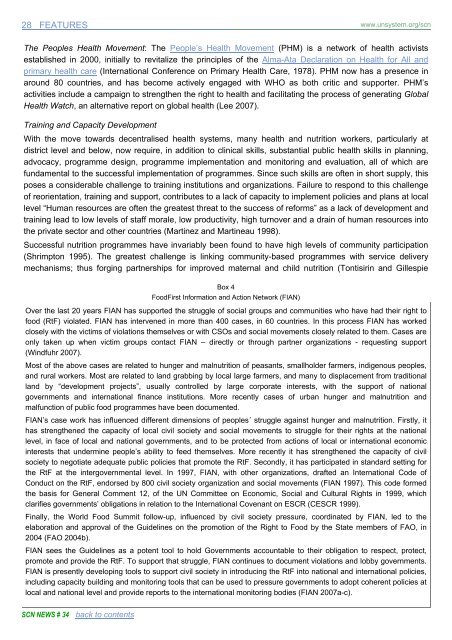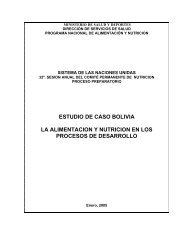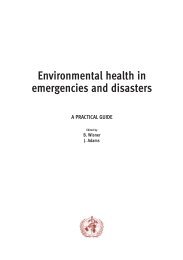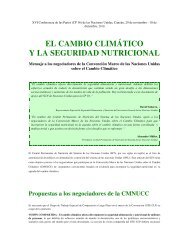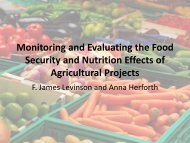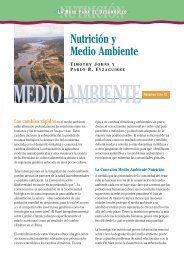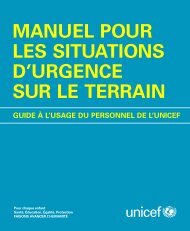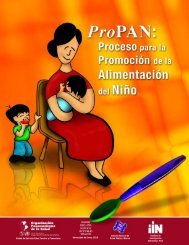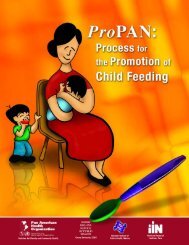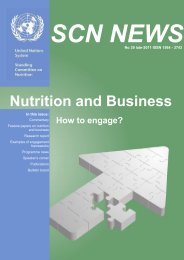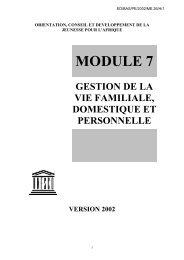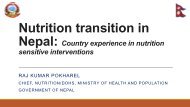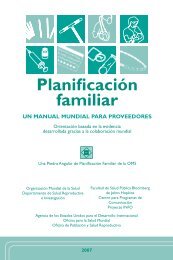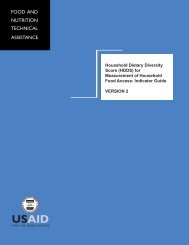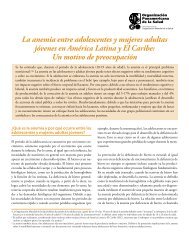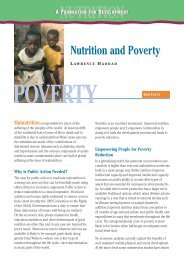SCN News No 34 - UNSCN
SCN News No 34 - UNSCN
SCN News No 34 - UNSCN
You also want an ePaper? Increase the reach of your titles
YUMPU automatically turns print PDFs into web optimized ePapers that Google loves.
28 FEATURES<br />
www.unsystem.org/scn<br />
The Peoples Health Movement: The People’s Health Movement (PHM) is a network of health activists<br />
established in 2000, initially to revitalize the principles of the Alma-Ata Declaration on Health for All and<br />
primary health care (International Conference on Primary Health Care, 1978). PHM now has a presence in<br />
around 80 countries, and has become actively engaged with WHO as both critic and supporter. PHM’s<br />
activities include a campaign to strengthen the right to health and facilitating the process of generating Global<br />
Health Watch, an alternative report on global health (Lee 2007).<br />
Training and Capacity Development<br />
With the move towards decentralised health systems, many health and nutrition workers, particularly at<br />
district level and below, now require, in addition to clinical skills, substantial public health skills in planning,<br />
advocacy, programme design, programme implementation and monitoring and evaluation, all of which are<br />
fundamental to the successful implementation of programmes. Since such skills are often in short supply, this<br />
poses a considerable challenge to training institutions and organizations. Failure to respond to this challenge<br />
of reorientation, training and support, contributes to a lack of capacity to implement policies and plans at local<br />
level “Human resources are often the greatest threat to the success of reforms” as a lack of development and<br />
training lead to low levels of staff morale, low productivity, high turnover and a drain of human resources into<br />
the private sector and other countries (Martinez and Martineau 1998).<br />
Successful nutrition programmes have invariably been found to have high levels of community participation<br />
(Shrimpton 1995). The greatest challenge is linking community-based programmes with service delivery<br />
mechanisms; thus forging partnerships for improved maternal and child nutrition (Tontisirin and Gillespie<br />
Box 4<br />
FoodFirst Information and Action Network (FIAN)<br />
Over the last 20 years FIAN has supported the struggle of social groups and communities who have had their right to<br />
food (RtF) violated. FIAN has intervened in more than 400 cases, in 60 countries. In this process FIAN has worked<br />
closely with the victims of violations themselves or with CSOs and social movements closely related to them. Cases are<br />
only taken up when victim groups contact FIAN – directly or through partner organizations - requesting support<br />
(Windfuhr 2007).<br />
Most of the above cases are related to hunger and malnutrition of peasants, smallholder farmers, indigenous peoples,<br />
and rural workers. Most are related to land grabbing by local large farmers, and many to displacement from traditional<br />
land by “development projects”, usually controlled by large corporate interests, with the support of national<br />
governments and international finance institutions. More recently cases of urban hunger and malnutrition and<br />
malfunction of public food programmes have been documented.<br />
FIAN’s case work has influenced different dimensions of peoples´ struggle against hunger and malnutrition. Firstly, it<br />
has strengthened the capacity of local civil society and social movements to struggle for their rights at the national<br />
level, in face of local and national governments, and to be protected from actions of local or international economic<br />
interests that undermine people’s ability to feed themselves. More recently it has strengthened the capacity of civil<br />
society to negotiate adequate public policies that promote the RtF. Secondly, it has participated in standard setting for<br />
the RtF at the intergovernmental level. In 1997, FIAN, with other organizations, drafted an International Code of<br />
Conduct on the RtF, endorsed by 800 civil society organization and social movements (FIAN 1997). This code formed<br />
the basis for General Comment 12, of the UN Committee on Economic, Social and Cultural Rights in 1999, which<br />
clarifies governments’ obligations in relation to the International Covenant on ESCR (CESCR 1999).<br />
Finally, the World Food Summit follow-up, influenced by civil society pressure, coordinated by FIAN, led to the<br />
elaboration and approval of the Guidelines on the promotion of the Right to Food by the State members of FAO, in<br />
2004 (FAO 2004b).<br />
FIAN sees the Guidelines as a potent tool to hold Governments accountable to their obligation to respect, protect,<br />
promote and provide the RtF. To support that struggle, FIAN continues to document violations and lobby governments.<br />
FIAN is presently developing tools to support civil society in introducing the RtF into national and international policies,<br />
including capacity building and monitoring tools that can be used to pressure governments to adopt coherent policies at<br />
local and national level and provide reports to the international monitoring bodies (FIAN 2007a-c).<br />
<strong>SCN</strong> NEWS # <strong>34</strong> back to contents


